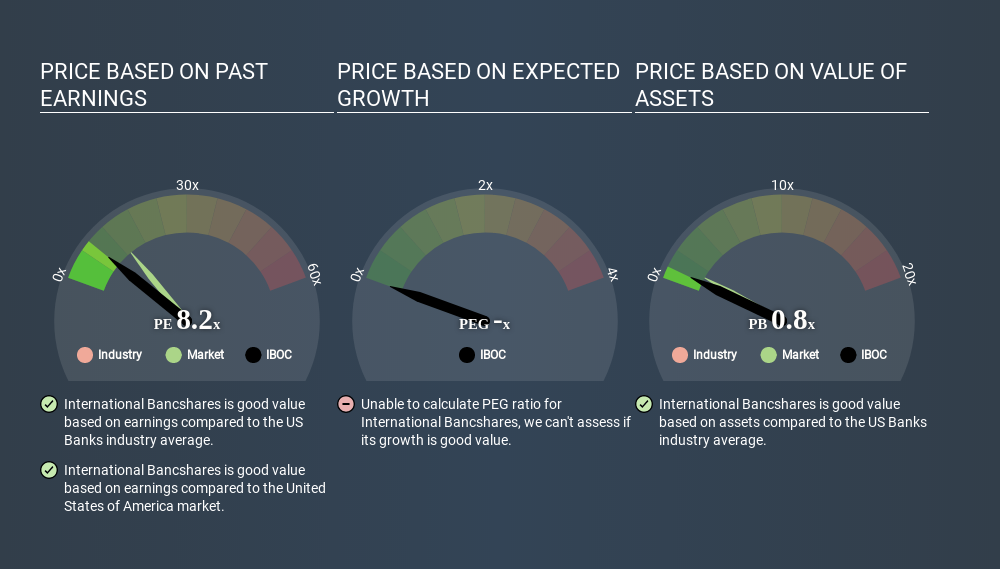Stock Analysis
- United States
- /
- Banks
- /
- NasdaqGS:IBOC
How Does International Bancshares's (NASDAQ:IBOC) P/E Compare To Its Industry, After Its Big Share Price Gain?

International Bancshares (NASDAQ:IBOC) shareholders are no doubt pleased to see that the share price has bounced 39% in the last month alone, although it is still down 40% over the last quarter. But shareholders may not all be feeling jubilant, since the share price is still down 37% in the last year.
Assuming no other changes, a sharply higher share price makes a stock less attractive to potential buyers. While the market sentiment towards a stock is very changeable, in the long run, the share price will tend to move in the same direction as earnings per share. So some would prefer to hold off buying when there is a lot of optimism towards a stock. One way to gauge market expectations of a stock is to look at its Price to Earnings Ratio (PE Ratio). A high P/E implies that investors have high expectations of what a company can achieve compared to a company with a low P/E ratio.
View our latest analysis for International Bancshares
Does International Bancshares Have A Relatively High Or Low P/E For Its Industry?
We can tell from its P/E ratio of 8.19 that sentiment around International Bancshares isn't particularly high. We can see in the image below that the average P/E (8.9) for companies in the banks industry is higher than International Bancshares's P/E.

Its relatively low P/E ratio indicates that International Bancshares shareholders think it will struggle to do as well as other companies in its industry classification. While current expectations are low, the stock could be undervalued if the situation is better than the market assumes. It is arguably worth checking if insiders are buying shares, because that might imply they believe the stock is undervalued.
How Growth Rates Impact P/E Ratios
Probably the most important factor in determining what P/E a company trades on is the earnings growth. When earnings grow, the 'E' increases, over time. That means even if the current P/E is high, it will reduce over time if the share price stays flat. So while a stock may look expensive based on past earnings, it could be cheap based on future earnings.
International Bancshares saw earnings per share decrease by 4.1% last year. But EPS is up 6.5% over the last 5 years.
A Limitation: P/E Ratios Ignore Debt and Cash In The Bank
It's important to note that the P/E ratio considers the market capitalization, not the enterprise value. Thus, the metric does not reflect cash or debt held by the company. The exact same company would hypothetically deserve a higher P/E ratio if it had a strong balance sheet, than if it had a weak one with lots of debt, because a cashed up company can spend on growth.
Such spending might be good or bad, overall, but the key point here is that you need to look at debt to understand the P/E ratio in context.
Is Debt Impacting International Bancshares's P/E?
International Bancshares has net debt worth 53% of its market capitalization. This is a reasonably significant level of debt -- all else being equal you'd expect a much lower P/E than if it had net cash.
The Bottom Line On International Bancshares's P/E Ratio
International Bancshares's P/E is 8.2 which is below average (13.6) in the US market. When you consider that the company has significant debt, and didn't grow EPS last year, it isn't surprising that the market has muted expectations. What is very clear is that the market has become less pessimistic about International Bancshares over the last month, with the P/E ratio rising from 5.9 back then to 8.2 today. If you like to buy stocks that could be turnaround opportunities, then this one might be a candidate; but if you're more sensitive to price, then you may feel the opportunity has passed.
When the market is wrong about a stock, it gives savvy investors an opportunity. If it is underestimating a company, investors can make money by buying and holding the shares until the market corrects itself. We don't have analyst forecasts, but you might want to assess this data-rich visualization of earnings, revenue and cash flow.
You might be able to find a better buy than International Bancshares. If you want a selection of possible winners, check out this free list of interesting companies that trade on a P/E below 20 (but have proven they can grow earnings).
If you spot an error that warrants correction, please contact the editor at editorial-team@simplywallst.com. This article by Simply Wall St is general in nature. It does not constitute a recommendation to buy or sell any stock, and does not take account of your objectives, or your financial situation. Simply Wall St has no position in the stocks mentioned.
We aim to bring you long-term focused research analysis driven by fundamental data. Note that our analysis may not factor in the latest price-sensitive company announcements or qualitative material. Thank you for reading.
About NasdaqGS:IBOC
International Bancshares
A financial holding company, provides commercial and retail banking services in Texas and the State of Oklahoma.
Flawless balance sheet, good value and pays a dividend.

